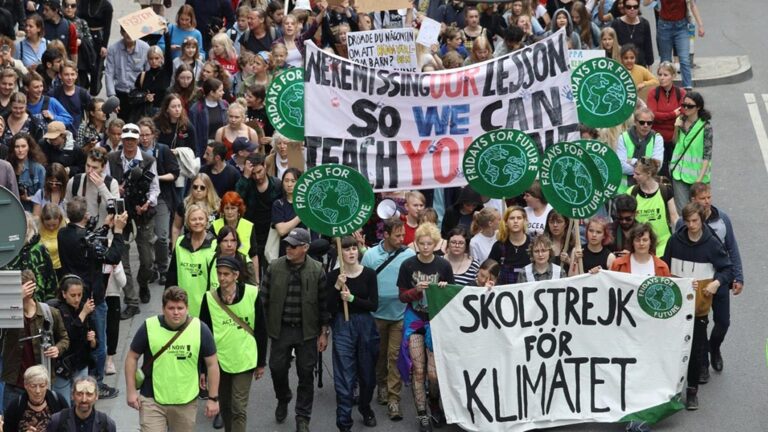Words like meat comb, fly comb, multi-child comb and SUV shame are becoming more common. Some change their lifestyles to make it easier to live with their climate shame, while others seem to become passive. Can shame create change - or is it rather paralyzing?
"You will die of age, our children will die of climate change!" was one of the posters held during the Fridays for Futures school strike on March 15 this year. Children all over the world are on school strike to draw attention to the climate crisis and get politicians to reach the Paris Agreement. Instagram account Unsuspecting influencers hangs out influencers' bad climate habits, and words like meat shame, flight shame, multiple child shame and SUV shame become more common. Environmentally friendly habits have been stigmatized, and we live with a fear of both being accused of, and feeling the shame of the climate ourselves.
Today we live in the middle of a climate threat, with melting ice, elevated temperatures, extreme weather and reduced biodiversity. Our way of life has devastating consequences, and the planet says no. Despite this, we seem to fly like never before; Swedes' air travel has more than doubled since 1990 and meat consumption in Sweden has increased by 40 percent since 1995. At the same time, some seem to feel a shame, where it has almost become more embarrassing than wonderful to fly, and just as untidy to eat meat as to wear fur.
Anders Wijkman, chairman of the organization Climate KIC explains in an interview that climate shame can have a positive effect in that individuals begin to think about what they can change in their lifestyle. Some are deeply affected by the shame and make an effort to speed up a change, he says.
During FUF and OmVärldens seminar "Shame - a sincere talk about the climate crisis" climate shame was discussed between Anders Wijkman, Åsa Romson, Emil Jensen and Kent Wisti. Åsa Romson, expert at IVL Swedish Environmental Institute, explained that shame can give rise to a desire and willingness to take on the challenge.
At the same time, the climate embargo also seems to have negative effects. Kent Wisti, a priest and visual artist, suggests that shame can have a paralyzing effect. Anders Wijkman also believes that shame can have a negative effect:
- The risk is, of course, that the whole discussion about "shame" turns upside down, that is, that a majority of the population feels jumpy and is not positively affected. It all depends on how the discussion is conducted, Wijkman writes.
Romson believes that we can have a great polarization in society.
- [SUV shame] is such a harsh concept that it makes the car owner turn away. It becomes even more reluctant to stand up for its car, she says.
Climate change that creates change
In the discussion about climate shame, the guilt also seems to be close, that we feel a guilt for our unsustainable lifestyles. Anders Wijkman sees that he has a clear climate debt. Partly when it comes to the rich world towards developing countries, but also a debt towards Greta Thunberg's generation. He also sees a debt as a high-income earner, where he generates more greenhouse gases than other people. A discussion of this, Wijkman believes, is important.
This guilt leads to a shame, says Emil Jensen, artist and poet. Shame is largely collective, and this becomes an energy that can create change. Jensen gets feelings of guilt in how we prevent each other from changing. We help each other not to feel ashamed by apologizing to each other.
- It is clear that you should not take the train, you can not trust SJ. Of course you have to go to New Zealand and hike. Otherwise you will not be able to get involved when you get home. That's how it worked with all the abuses in history, Jensen explains.
Must move away from the individual
How can we then use the shame so that it has positive effects on the climate? By moving away from the individual shame, the shame can become constructive and useful, says Kent Wisti. It is important that we stop judging each other, because we know so little about each other's lives, he says.
The collective shame, unlike the individual, is the one that can create change, says Romson. What we need is an organization and a collective movement to create change in earnest.
- The individual shame quickly becomes a passivation, it becomes so close to a feeling of panic, she says.
Romson, on the other hand, believes that collective shame is a moral paradigm in an issue.
- I really think that is what we have missed, but which has now begun to trump, Romson explains.
Wijkman thinks that what is important to discuss in the issue of climate shame is how ethical the world is structured. He believes that the behavior of individuals is important, but that the structures of society are even more important. That is why we must start at the societal level. We can therefore not solve the climate crisis at the individual level.
- It is in politics that we must seek the important solutions, and it is not possible without mobilization. If we just get anxious and feel ashamed, we do no good. Act with full force instead!
During FUF's seminar in Almedalen, visitors got a chance to tell through a website what they feel ashamed of. Words such as: "dairy", "air travel", "clothing purchases", and "meat" were common, but also "passivity" and "nothing" occurred. It is clear that the climate crisis affects us differently.

